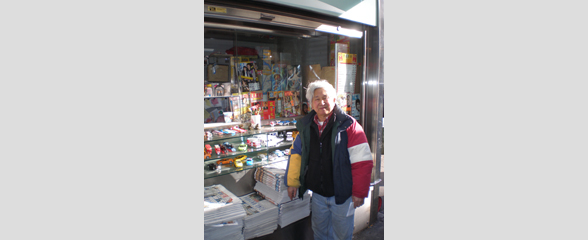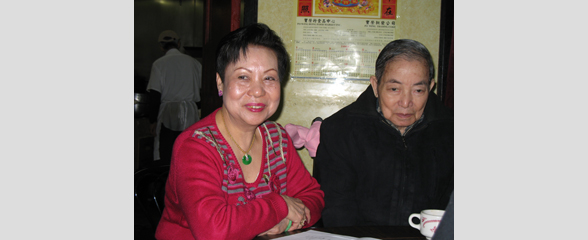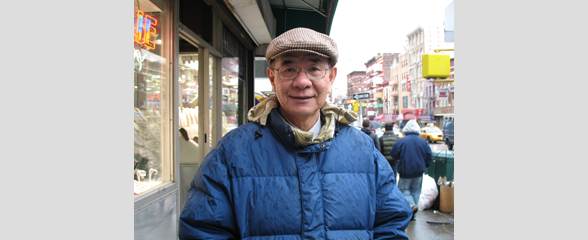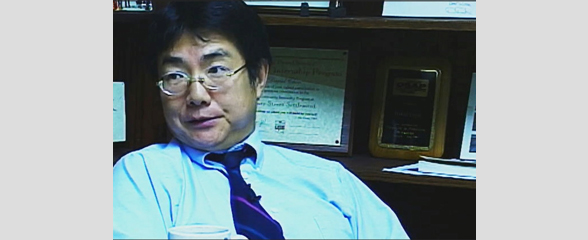Older Chinese Americans

2008.040.004 Oral History Interview with Francis Tso July 13, 2010
Francis Tso moved to the United States from Hong Kong in 1976, and settled two year later in Chinatown. For over thirty years, he and his wife have run a newsstand located on Canal Street that was handed down from Tso’s father and leased through the city. Tso portrays Chinatown as a haven for those who do not speak English and, while he says he has seen an increase in business at his stand as a result of development in the area, he also realizes that many non-English speakers are finding it increasingly difficult to stay in Chinatown. They are in an especially hard situation, he says, because their lack of English knowledge prohibits them from moving elsewhere. Over the thirty years that Tso has lived and worked in Chinatown, he has seen many buildings and business dissolved or torn down. As his stand is on Canal Street, he has also witnessed firsthand the increase in the counterfeit market on Canal. Again, Tso sees two sides to the issue. While more customers at the counterfeit stands means more potential customers at his newsstand, he would like to see a community center built in Chinatown that could offer a place for young people to “hang outâ€â€”keeping them away from the counterfeit market. When asked if he might consider retiring, Tso firmly answers that he will continue to operate the stand as long as he is physically able, even though none of his children are interested in running the stand themselves.

2008.040.018 Oral History Interview with Mr. and Mrs. Chan March 7, 2008
Mr. and Mrs. Chan, founders and owners of the long established and renowned coffee
shop and restaurant, Mei Lai Wah, in New Yorks Chinatown, are both Taishan natives, who claim that New York, especially their restaurant, is home to them. Upon arrival, Mr. Chan was employed at a bakery, the culinary training from which he later applied to his own business, Mei Lai Wah. Mr. Chan explains that he runs his business like a family and has not changed anything since he first opened it in 1968. He celebrates that his employees, who are also from the same village as Mr. Chan, have stayed with the business since its opening. As a result of rising rent, Mr. and Mrs. Chan have witnessed family-owned business closures and fear that the increasing expense of living in Chinatown may drive Chinese immigrants to settle outside of the unique cultural community. Despite their concerns over rent increases and their employees increasing age, both Mr. and Mrs. Chan hope to sustain their beloved business for as long as possible. Ultimately, when Mr. and Mrs. Chan decide to retire, they will not be handing down the restaurant to their children since none of them have expressed interest in continuing the operations of the business or living in Chinatown.

2008.040.019 Oral History Interview with Ho Ying Pang March 16, 2008
Pang Ho Ying was born in Taishan, China, but grew up and spent a large portion of his life in Hong Kong until he moved to New York with his wife in 1988. Interestingly, his family was divided on both the East and West coasts: he and his two brothers settled in New York, while his two sisters moved to San Francisco. Pang vaguely remembers his first impression of New York upon his arrival as relatively less modern than Hong Kong, claiming that Chinatown appeared backwards since it lacked the modern buildings and technology of Hong Kong. Regardless, Pang perceived Chinatown as a friendly and supportive environment that deeply valued family relationships and friendships.
Though Pang did not plan or arrange employment in the United States before immigrating, he trusted he would find a suitable job. After two months, he found work through his younger brother as a general handyman or “gofer†at the Music Palace theater. Pang eventually became the director of the theater and managed the daily operations until he retired. In his interview, Pang walks through the history of the Music Palace and offers his opinions on what ultimately brought about the movie theater’s demise in 2000. Pang asserts that the reason the theater went out of business was because it was no longer in demand after the popularization of the relatively cheaper videotape rental. As the theater began running deficits and attendance records started dwindling, Pang recommended to the Hong Kong based theater owners that the business close its doors, bringing an end to the last movie theater that specialized in Hong Kong cinema in the United States. Pang recognizes the pragmatic reasons for closing the Music Palace but still expresses regret that the theater could no longer serve as a community gathering place for residents and visitors alike.
Pang goes on to identify some of the changes that he has witnessed in Chinatown more broadly, particularly that many old buildings had been upgraded and renovated, empty and vacant lots had gradually been built up, rent prices had skyrocketed, and the general aesthetics of the neighborhood had improved. He also hints at a generational shift and ethnic tension, comparing the new wave of Fukienese immigrants with the older generation of mainland Chinese immigrants to the neighborhood. While Pang notes that his children do not desire to return to Chinatown, he still explains that he hopes to remain living in Chinatown because of its convenient location, the Chinese food and tea, and general familiarity.

2014.036.015 Oral History Interview with David Chen July 13, 2004
In this interview, David Chen discusses his work at Chinese-American Planning Council (CPC) as an activist in New York City Chinatown. Chen is the director of CPC, a private organization started in 1965 serving the public and focusing on low-income immigrant families, mostly Chinese. Services offered include language classes, translations, daycare centers, job training for adults, senior citizen care, childcare, and Meals on Wheels. Prior to his work at CPC, Chen worked for the mayor in Chicago. While there, he constantly questioned why there was no Chinese funding. While in college, Chen studied to be a social worker and community organizer. He explains that he was not good at chemistry and did not want to pursue medicine or law like his parents expected him to. During college, he and his friends volunteered in Chicago Chinatown, which is much smaller than New York City. In Chicago Chinatown, Chen and his friends taught English classes but there were not many job opportunities in the community, so he decided to work for the government. On a visit to New York City, Chen fell in love with how densely populated and large Chinatown was and was told that there were many job opportunities available. He applied for a position at CPC as a youth director twenty-three years ago, accepted the role, and moved to New York City. Chen was part of "Project Reach", which was an at-risk prevention program for troubled kids. He describes Chinatown as a transient neighborhood in that there is constantly an influx of Chinese immigrants every few years. CPC serves those immigrants by helping them get entry-level jobs and helping them get their foot in the door. By doing so, he hopes that secure immigrants who have gotten aid from CPC would be able to help the next wave. Asked about his upbringing, Chen shares that he is from an upper-middle class family and that his father was an engineer. He was originally born in Shanghai but his family moved to Hong Kong while he was a baby. He came alone to the United States during his final year of high school and focused on school in order to avoid being drafted into the Vietnam War. The last part of the interview briefly covers 9/11. Chen notes that in the recovery and aftermath, Chinatown was largely ignored although it was an adjacent neighborhood to the World Trade Center. Chen also describes how important Chinatown is to tourism because of its restaurants and shopping venues.

2014.036.015 Oral History Interview with David Chen July 13, 2004
In this interview, David Chen discusses his work at Chinese-American Planning Council (CPC) as an activist in New York City Chinatown. Chen is the director of CPC, a private organization started in 1965 serving the public and focusing on low-income immigrant families, mostly Chinese. Services offered include language classes, translations, daycare centers, job training for adults, senior citizen care, childcare, and Meals on Wheels. Prior to his work at CPC, Chen worked for the mayor in Chicago. While there, he constantly questioned why there was no Chinese funding. While in college, Chen studied to be a social worker and community organizer. He explains that he was not good at chemistry and did not want to pursue medicine or law like his parents expected him to. During college, he and his friends volunteered in Chicago Chinatown, which is much smaller than New York City. In Chicago Chinatown, Chen and his friends taught English classes but there were not many job opportunities in the community, so he decided to work for the government. On a visit to New York City, Chen fell in love with how densely populated and large Chinatown was and was told that there were many job opportunities available. He applied for a position at CPC as a youth director twenty-three years ago, accepted the role, and moved to New York City. Chen was part of "Project Reach", which was an at-risk prevention program for troubled kids. He describes Chinatown as a transient neighborhood in that there is constantly an influx of Chinese immigrants every few years. CPC serves those immigrants by helping them get entry-level jobs and helping them get their foot in the door. By doing so, he hopes that secure immigrants who have gotten aid from CPC would be able to help the next wave. Asked about his upbringing, Chen shares that he is from an upper-middle class family and that his father was an engineer. He was originally born in Shanghai but his family moved to Hong Kong while he was a baby. He came alone to the United States during his final year of high school and focused on school in order to avoid being drafted into the Vietnam War. The last part of the interview briefly covers 9/11. Chen notes that in the recovery and aftermath, Chinatown was largely ignored although it was an adjacent neighborhood to the World Trade Center. Chen also describes how important Chinatown is to tourism because of its restaurants and shopping venues.